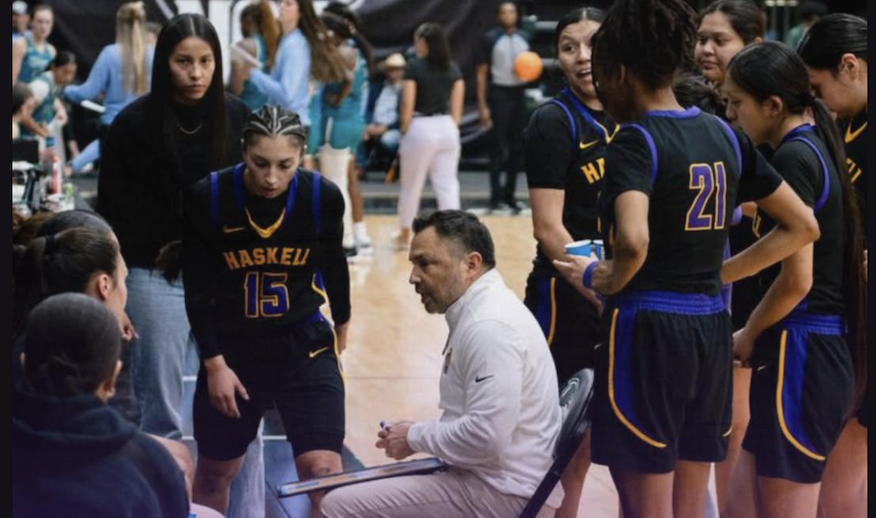
- Details
- By Kaili Berg
The Haskell Indian Nations University (HINU) women's basketball team is set to compete in the first round of the NAIA National Championship this Friday in Sioux Center, Iowa.
The team, which enters the tournament as a determined underdog, will face Dordt University at 5:30 PM CST. Despite challenges both on and off the court, the players are ready to represent Indian Country at the national level.
HINU enters the tournament with a 13-13 overall record and a strong showing in the Continental Athletic Association (CAA), where they finished with a 4-1 conference record.
Dordt enters the tournament with a 29-2 record and a high-powered offense averaging 84.1 points per game.
The team’s ability to adapt and persevere has defined their season, with key victories over teams like Northwest Indian College, Peru State, and Valley City State.
The Lady Indians hold a roster with multiple scoring threats, including Myona Dauphinais (16.0 PPG), Mahpiya Irving (11.2 PPG, 4.6 RPG), and Tierzah Penn (11.0 PPG).
“I have 14 players, and I feel like I have 14 starters. That depth is what makes us special,” Coach Adam Strom said in a recent interview with Native News Online.
The team’s up-tempo style, focus on three-point shooting, and defensive pressure make them an intimidating opponent.
On February 14th, Coach Strom was informed of his termination due to an executive order affecting federal employees. Despite losing his paid position, Strom chose to stay on as head coach in a voluntary capacity, a decision that has drawn national attention.
“I immediately asked, ‘Can I still remain on as head coach?’” Strom said. “I knew the answer had to be yes. If I’m asking my players to be committed, dedicated, and resilient, then I have to live by those same values.”
The recent terminations at Haskell affected nearly 40 staff members, including professors and support staff, leaving students uncertain about the future of their education and athletics.
Despite the uncertainty surrounding the program, the team remains focused on the tournament.
“Termination has led to determination,” Strom said. “These players are ready to compete, and they know they’re playing for more than just themselves, they’re playing for Haskell, for their families, and for Indian Country.”
This past Monday, Coach Strom was hired back through a contract.
As the team prepares for their biggest game of the season, efforts are underway to support Haskell through donations and advocacy. The Haskell Foundation is accepting contributions to assist displaced staff, and Native leaders are calling for federal intervention to restore funding.
The game will be streamed live on the NAIA website, allowing supporters across the country to watch the team’s inspiring journey unfold.
More Stories Like This
Native News Weekly (August 25, 2024): D.C. BriefsUS Presidents in Their Own Words Concerning American Indians
Indigenous Actor Elaine Miles Reports Detention by Alleged ICE Agents
Happy Thanksgiving from Native News Online
Coming Up on Native Bidaské: Behind the Animation: Joey Clift Talks “Pow” and Native Storytelling
Help us tell the stories that could save Native languages and food traditions
At a critical moment for Indian Country, Native News Online is embarking on our most ambitious reporting project yet: "Cultivating Culture," a three-year investigation into two forces shaping Native community survival—food sovereignty and language revitalization.
The devastating impact of COVID-19 accelerated the loss of Native elders and with them, irreplaceable cultural knowledge. Yet across tribal communities, innovative leaders are fighting back, reclaiming traditional food systems and breathing new life into Native languages. These aren't just cultural preservation efforts—they're powerful pathways to community health, healing, and resilience.
Our dedicated reporting team will spend three years documenting these stories through on-the-ground reporting in 18 tribal communities, producing over 200 in-depth stories, 18 podcast episodes, and multimedia content that amplifies Indigenous voices. We'll show policymakers, funders, and allies how cultural restoration directly impacts physical and mental wellness while celebrating successful models of sovereignty and self-determination.
This isn't corporate media parachuting into Indian Country for a quick story. This is sustained, relationship-based journalism by Native reporters who understand these communities. It's "Warrior Journalism"—fearless reporting that serves the 5.5 million readers who depend on us for news that mainstream media often ignores.
We need your help right now. While we've secured partial funding, we're still $450,000 short of our three-year budget. Our immediate goal is $25,000 this month to keep this critical work moving forward—funding reporter salaries, travel to remote communities, photography, and the deep reporting these stories deserve.
Every dollar directly supports Indigenous journalists telling Indigenous stories. Whether it's $5 or $50, your contribution ensures these vital narratives of resilience, innovation, and hope don't disappear into silence.
 The stakes couldn't be higher. Native languages are being lost at an alarming rate. Food insecurity plagues many tribal communities. But solutions are emerging, and these stories need to be told.
The stakes couldn't be higher. Native languages are being lost at an alarming rate. Food insecurity plagues many tribal communities. But solutions are emerging, and these stories need to be told.
Support independent Native journalism. Fund the stories that matter.
Levi Rickert (Potawatomi), Editor & Publisher

